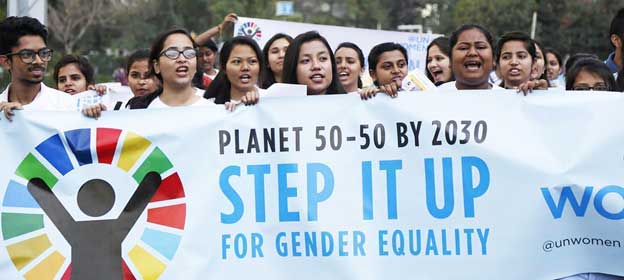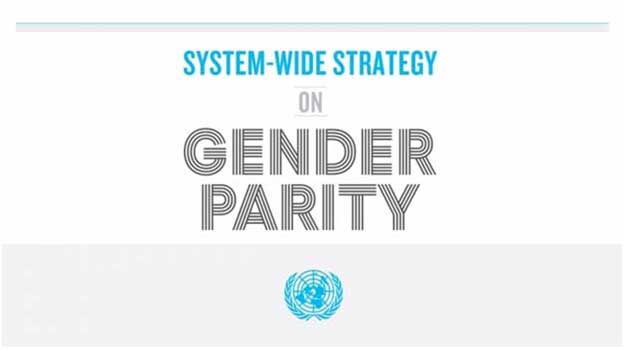Gender Inequality: A Question of Power in a Male-Dominated World, Declares UN Chief

UNITED NATIONS, Dec 21 (IPS) - UN Secretary-General Antonio Guterres has singled out Gender Parity as one of his key priorities in his second term in office, beginning 2023.
Describing it as “a strategic goal of the Organization,” he pointed out some of the “notable advances achieved in the past five years.”
Gender parity, he said last week, has been reached among the UN’s senior leadership two years ahead of the target date; along with parity among heads and deputy heads of peace operations; as well as parity among the 130 Resident Coordinators.
The number of UN entities, with at least 50 percent women staff, has also risen from five to 26.
But, the Secretary-General added, gaps remain. In the field, “progress has been slow, and in some cases, we have gone backwards”.
“Therefore, the next phase of implementing the Gender Parity Strategy will focus on advancing and sustaining progress in the field.”
He pointed out that gender inequality is essentially a question of power.
“Our male-dominated world and male-dominated culture damage both men and women. And to transform power relations, we need equality between men and women in leadership, decision-making and participation at all levels. “
Still, the 193 member states lag far behind in promoting gender parity and gender empowerment.
There have been nine secretaries-generals over the last 77 years—all men.

Trygve Lie of Norway, Dag Hammarskjold of Sweden, U. Thant of Burma (now Myanmar), Kurt Waldheim of Austria, Javier Perez de Cuellar of Peru, Boutros Boutros-Ghali of Egypt, Kofi Annan of Ghana, Ban Ki-moon of South Korea and, currently, Antonio Guterres of Portugal.
The male-female ratio for the Secretary-General stands at 9 vs zero. And the Presidency of the General Assembly (PGA), the highest policy-making body at the UN, is not far behind either.
The only four women elected as presidents were: Vijaya Lakshmi Pandit of India (1953), Angie Brooks of Liberia (1969), Sheikha Haya Rashed Al-Khalifa of Bahrain (2006) and Maria Fernando Espinosa Garces of Ecuador (2018).
The score stands at 73 men and 4 women as PGAs– even as the General Assembly elected another male candidate, as its 77th President, and who serves his one-year term, beginning September 2022.
The 15-member Security Council's track record is probably worse because it has continued to elect men as UN Secretaries-General, rubber-stamped by the General Assembly, – despite several outstanding women candidates.
Purnima Mane, a former Deputy Executive Director of the UN Population Fund (UNFPA), with the rank of UN Assistant-Secretary-General (ASG), told IPS the UN Secretary General’s recent remarks on gender empowerment in the UN evoke a mixed reaction.
“While one can certainly celebrate the progress made by the UN in this area, one would also regret the lack of it in many areas that have proven resistant to change. As SG Antonio Guterres stated, gender parity has been achieved for the first time in the UN in 2020 and two years ahead of the target date, to boot”.
The SG gave several examples among senior leadership in the Organization, including Resident Coordinators, where gender parity has grown significantly. But he admitted that gaps remain, and mentioned the slow progress in the field.
However, one of the most difficult areas to change has been one over which the member states exercise control, she noted.
“As many have repeatedly said over the last several years is that there has not been a single woman SG in the history of the UN and only 4 women have been presidents of the General Assembly, the UN’s highest policy-making body, as compared to 73 men.”
To date, it has also been difficult to raise the number of women UN ambassadors, which remains regrettably low. And this despite the significant number of resolutions supporting gender empowerment which have been adopted by the GA and key UN committees, said Mane, a former President and CEO of Pathfinder International.
At the current rate of progress, Guterres said, the Secretariat as a whole is forecast to be close to parity in professional staff in 2025 – three years before the deadline.
“But this aggregate figure disguises the fact that in the field, we are unlikely to reach parity at any level by 2028”.
So, the next phase of implementing the Gender Parity Strategy must therefore focus on advancing and sustaining progress in the field.
He said he was also pleased to see positive changes to support gender parity in the wider working environment.
“I welcome the decision of the International Civil Service Commission (ICSC) to recommend 16 weeks of parental leave for all parents, and to provide an additional 10 weeks to birth mothers to meet their specific needs.
These recommendations are now under consideration by the General Assembly’s Fifth Committee. “And once again I ask for the support of the members of this group.”
Roopa Dhatt, Executive Director, Women in Global Health (WGH), told IPS: “We applaud the statement by UN Secretary-General António Guterres last week -- and the progress made within the UN system towards reaching gender parity in leadership.”
“We agree with the Secretary-General that there remain gaps and areas where progress is still lacking. Women in Global Health remains committed to supporting the UN, particularly in the health sector, to achieve equality and leadership in the UN which will be a game changer not only for women but also for achieving the UN‘s mission,” she said.
“We have campaigned for equal leadership for women in global health since we were launched in 2015. Women are 70% health workers but hold only 25% senior leadership roles. So, the issue is not attracting women into the health sector, the issue is addressing the barriers that keep women out of leadership”.
WGH tracks the percentage of women in global governance in health.
“Our data shows that women are seriously underrepresented, especially women from the Global South. It also shows that women have lost ground in health governance since the start of the pandemic”, she declared.
Mane said it is truly regrettable that when it comes to acting on their good intentions and rhetoric on gender empowerment, the member states do not seem to indicate a sense of urgency.
One cannot say that there is lack of global pressure and support to take the necessary steps. For example, before every election of the UN SG over the last several years, the need to seriously consider a woman candidate has been raised by different UN stakeholders, not just civil society, and with every year, this advocacy has grown substantially, she argued.
Having a woman in the role of the SG was raised to a critical level of discussion at the last election of the SG when there were several female candidates who were being considered but business went on as usual.
“We are fortunate to have a strong SG in Guterres and one who values gender parity and empowerment. With the help of continued and heightened advocacy from all quarters, the strong examples of stellar female leadership especially in relation to the efforts to work on the multiple crises the world is facing (including the COVID pandemic and areas like climate change), and the UN’s repeated calls for gender empowerment, a strong case has already been made for the member States to act on areas that are not progressing in gender empowerment within the UN – by electing a woman in the role of the SG, increasing the proportion of women in the role of the President of the General Assembly and building up the number of women UN ambassadors”.
By taking on their own calls for gender empowerment, the member States would thereby show that they are serious about translating the rhetoric of gender empowerment into concrete action, even in areas which have earlier proven difficult to change, she declared.
Meanwhile, A study published in April this year by the WGH network on gender representation in World Health Assemblies (WHA) (from 1948-2021) found that 82.9% of delegations were composed of a majority of men, and no WHA had more than 30% of women Chief Delegates (ranging from 0% to 30%).
At the current rate, some countries may take over 100 years to reach gender parity in their WHA delegations. In January 2022 WGH calculated that only 6% of members of the World Health Organization’s Executive Board were women, down from an all-time high of 32% in 2020 .
WGH’s research in 2020 showed that 85% of national covid-19 task forces had majority male membership. The extraordinary work by women in the pandemic right across the health workforce has not translated into an equal seat at the decision-making table.
WGH has campaigned for senior leadership posts in the UN and other multilaterals in health to have equal representation of women.
To date, eight of the 13 Global Action Plan agencies in health (WHO, International Labour Organization, Global Fund Financing Facility, United Nations Development Programme, Unitaid, Global Fund, Gavi, the Vaccine Alliance and World Bank), the most influential in policy and spending, are headed by men from high income countries.
Only one - UNAIDS - is headed by a woman from a low-income country.
“We commend Dr Tedros, Director General of the World Health Organization, for his efforts when he took up office in 2017 to appoint a majority (60 percent) of women to the senior leadership team”, said Dhatt.
IPS UN Bureau Report
Twitter and Instagram
Follow @IPSNewsUNBureau
Follow IPS News UN Bureau on Instagram
© Inter Press Service (2022) — All Rights Reserved. Original source: Inter Press Service
Where next?
Browse related news topics:
Read the latest news stories:
- 3-week Gaza aid ban ‘collective punishment’: UNRWA chief Sunday, March 23, 2025
- Mind your language: The battle for linguistic diversity in AI Sunday, March 23, 2025
- World Day for Glaciers: Glaciers Are in Threat, May Not Survive the 21st Century Saturday, March 22, 2025
- Turning the Tide on Tuberculosis: Ensuring Access, Treatment, and Prevention for All Communities Friday, March 21, 2025
- The Toll of Mental Health in Conflict Areas Friday, March 21, 2025
- Food Security and Water, a Priority for Border Towns in Central America Friday, March 21, 2025
- A Weapon in the Fight for Water Security: Preserving the Glaciers Friday, March 21, 2025
- Glaciers Of The SADC Region – A Wake-Up Call For Climate Action Friday, March 21, 2025
- How Rare Rhino, Tiger Conservation Has Locked Out Indigenous Communities Friday, March 21, 2025
- Award Winning Women Goat Herders in Chile Confront Climate Change Friday, March 21, 2025